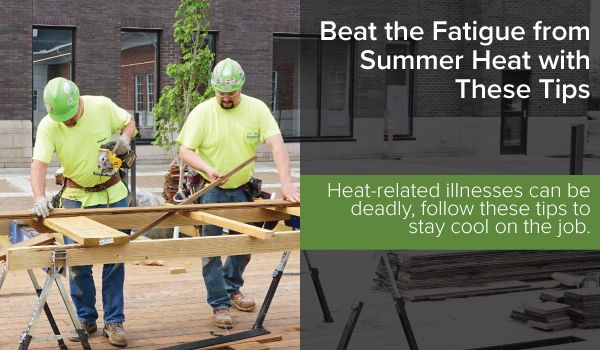Written by Matt Taylor, CHST, SMS
Beat the Fatigue from Summer Heat with These Tips
Heat-related illnesses can be deadly, follow these tips to stay cool on the job.
With temperatures in our area rising rapidly it is critical to revisit the importance of recognizing heat-related injuries and understanding how to prevent them. It takes between 4-14 days for the human body to get acclimated to working in the heat. The key to successfully working in hot temperatures is not simply in being acclimated to the heat, but knowing how to avoid heat illness or exhaustion.
Prevention is the key here is how to avoid the symptoms of heat stress.
- Let your supervisor know if you are not acclimated to the heat.
- Drink eight cups of water per hour, in extreme conditions, we can sweat out up to one quart of water an hour, which can be dehydrating.
- Take a gradual approach to working in the heat in time increments.
- Take a cool-down rest period in the shade for 5 minutes minimum.
- Wear light-colored clothing and hats, avoid dark and black colors which absorb the heat
- Wear an ice vest.
- Consume light foods, avoid caffeine, sugary/salty foods and alcohol which deplete your body of water.
- Be mindful if you are on any medications that could affect your reaction to the sun and heat, consult your doctor.
- Wear sunglasses and sunscreen.
- Look out for your fellow coworkers during hot temperatures.
When prevention fails, it’s important to understand the 4 types of heat illnesses and their proper treatment to avoid serious injury. If you think you or anyone else in the field are experiencing any of these, it is critical you get treatment immediately as one heat-related illness can rapidly increase into another more serious one.
Heat Rash - A red cluster of pimples caused by sweat
Treatment: A cold shower followed by calamine lotion
Heat Cramps - These are painful muscle spasms caused by strenuous activities in the heat
Treatment: Rest in the shade, drink water and massage the muscle area. If cramps do not dissipate after an hour you must seek medical attention. You may drink Gatorade, but if you do, you must follow up with two bottles of water. Gatorade contains sodium which can make you feel more dehydrated.
Heat Exhaustion - Cool moist pale skin, nausea, vomiting
Treatment: Go to shade or a cool area immediately, shower with cool water, have a sports beverage, remove or loosen clothing, and remove any heavy PPE.
Heat Stroke - Dry, hot skin, raised internal temperature, dizziness, confusion, headache slurred speech, and cardiovascular collapse. The human body can reach 106 degrees in as little as 10 minutes. If someone has these symptoms they must be cooled down quickly to avoid brain damage.
Treatment: Move the person to a cool and shady place, place cold cloths on them, or ice packs, remove clothing or heavy PPE, and fan vigorously. If no one is nearby to help call 911. Do not let anyone with these symptoms leave the jobsite on their own. They could die before reaching their home or the hospital.
OCP Contractors is a team committed to safety. It is our duty to hold ourselves and all others on the jobsite accountable for safe practices. As you reflect on this month’s Toolbox Talk I encourage you to share your insights with others in the field and to remember the signs of heat illness when working through the hot summer months. Keep in mind that every minute someone is left unhelped with a serious heat injury equates to 10% brain damage, five minutes equals 50% of brain damage. People have died in as little as 7 minutes. Together, we can prevent these accidents and continue to showcase the work and practices that make us the Contractor of Choice.
OCP's priority is the safety of every employee. If you experience heat illness on the job, in the interest of your safety you will be asked if you would like to see a doctor before going home.

